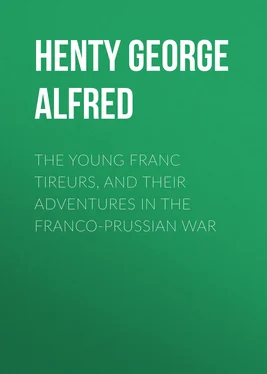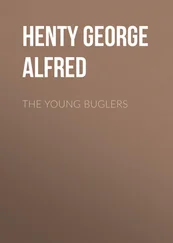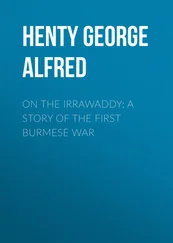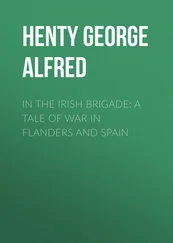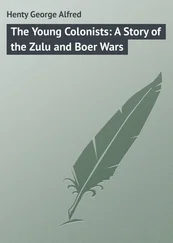George Henty - The Young Franc Tireurs, and Their Adventures in the Franco-Prussian War
Здесь есть возможность читать онлайн «George Henty - The Young Franc Tireurs, and Their Adventures in the Franco-Prussian War» — ознакомительный отрывок электронной книги совершенно бесплатно, а после прочтения отрывка купить полную версию. В некоторых случаях можно слушать аудио, скачать через торрент в формате fb2 и присутствует краткое содержание. Жанр: foreign_children, foreign_antique, foreign_prose, prose_military, на английском языке. Описание произведения, (предисловие) а так же отзывы посетителей доступны на портале библиотеки ЛибКат.
- Название:The Young Franc Tireurs, and Their Adventures in the Franco-Prussian War
- Автор:
- Жанр:
- Год:неизвестен
- ISBN:нет данных
- Рейтинг книги:3 / 5. Голосов: 1
-
Избранное:Добавить в избранное
- Отзывы:
-
Ваша оценка:
- 60
- 1
- 2
- 3
- 4
- 5
The Young Franc Tireurs, and Their Adventures in the Franco-Prussian War: краткое содержание, описание и аннотация
Предлагаем к чтению аннотацию, описание, краткое содержание или предисловие (зависит от того, что написал сам автор книги «The Young Franc Tireurs, and Their Adventures in the Franco-Prussian War»). Если вы не нашли необходимую информацию о книге — напишите в комментариях, мы постараемся отыскать её.
The Young Franc Tireurs, and Their Adventures in the Franco-Prussian War — читать онлайн ознакомительный отрывок
Ниже представлен текст книги, разбитый по страницам. Система сохранения места последней прочитанной страницы, позволяет с удобством читать онлайн бесплатно книгу «The Young Franc Tireurs, and Their Adventures in the Franco-Prussian War», без необходимости каждый раз заново искать на чём Вы остановились. Поставьте закладку, и сможете в любой момент перейти на страницу, на которой закончили чтение.
Интервал:
Закладка:
Before Madame Duburg had time to answer, the gentlemen joined them, and the conversation turned upon the war. In a short time the three girls came up.
"What a rosy little thing you are, Milly," her uncle said; "where do you get your plump cheeks, and your bright color? I wish you could give the receipt to Julie and Justine. Why, if you were to blow very hard, I do think you would blow them both down."
"I am really surprised at you, Monsieur Duburg," his wife said, angrily. "I am sure I do not wish Julie and Justine to have as much color as their cousin. I consider it quite a misfortune for poor Milly. It is so very commonplace. Poor child, she looks as if she had been working at the vintage."
"That is right, madame; stand up for your own," and her husband, who was accustomed to his wife's speeches, laughed. "But for all that, commonplace or not commonplace, I should like to see some of Milly's bright, healthy color in my girls' cheeks; and I should like to see them walk as if they had forgotten, for a moment, their tight boots and high heels."
His wife was about to make an angry reply, when the arrival of the four boys–bearing in triumph the last basket of plums–changed the conversation; and shortly afterwards, Madame Duburg remarking that the evening was damp, and that she did not like Julie and Justine to be out in it any later, the Du burgs took their leave.
Chapter 2: Terrible News
The ten days succeeding the declaration of war were days of excitement, and anticipation. The troops quartered at Dijon moved forward at once; and scarcely an hour passed but long trains, filled with soldiers from Lyons and the South, were on their way up towards Metz. The people of Dijon spent half their time in and around the station. The platform was kept clear; but bands of ladies relieved each other every few hours, and handed soup, bread, fruit, and wine to the soldiers as they passed through. Each crowded train was greeted, as it approached the station, with cheers and waving of handkerchiefs; to which the troops as heartily responded. Most of the trains were decorated with boughs, and presented a gay appearance as, filled with the little line men, the sunburned Zouaves, swarthy Turcos, gay hussars, or sober artillerymen, they wound slowly into the town.
Some of the trains were less gay, but were not less significant of war. Long lines of wagons, filled with cannon; open trucks with the deadly shell–arranged side by side, point upwards, and looking more like eggs in a basket than deadly missiles–came and went. There, too, were long trains of pontoons for forming bridges while, every half hour, long lines of wagons filled with biscuits, barrels of wine, sacks of coffee, and cases of stores of all sorts and kinds passed through.
The enthusiasm of Dijon, at the sight of this moving panorama of war, rose to fever heat. The sound of the Marseillaise resounded from morning to night. Victory was looked upon as certain, and the only subject of debate was as to the terms which victorious France would impose upon conquered Prussia. The only impatience felt was for the news of the first victory.
Captain Barclay sent down several casks of wine, for the use of the passing troops; and his wife went down, each day, to assist at the distribution. In the evening she and Milly scraped old rags, to make lint for the wounded. The Lycee was still closed–as it was found impossible to get the boys to attend to their studies–and Ralph and Percy spent their time in watching the trains go past, and in shouting themselves hoarse.
Captain Barclay did not share in the general enthusiasm and, each morning at breakfast, he looked more and more grave as, upon opening the papers, he found there was still no news of the commencement of hostilities.
"What difference does it make, papa?" Ralph asked, one day; "we are sending fresh troops up, every hour, and I do not see how a few days' delay can be any disadvantage to us."
"It makes all the difference, Ralph, all the difference in the world. We had a considerably larger standing army than the Prussians, and had the advantage that the main body of our troops were very much nearer to the frontier than those of the Prussians. If things had been ready, we ought to have marched two hundred thousand men into Germany, three or four days–at latest–after the declaration of war. The Germans could have had no force capable of resisting them. We should have had the prestige of a first success–no slight thing with a French army–and we should also have had the great and solid advantage of fighting in an enemy's country, instead of upon our own.
"The German reserves are far greater than our own. We know how perfect their organization is, and every hour of delay is an immense advantage to them. It is quite likely now that, instead of the French invading Germany, it will be the Prussians who will invade France."
The boys were but little affected by their father's forebodings. It was scarcely possible to suppose that everyone could be wrong; still more impossible to believe that those great hosts which they saw passing, so full of high hope and eager courage, could be beaten. They were, however, very glad to sit round the table of an evening, while Captain Barclay opened a great map on the table, explained the strength of the various positions, and the probability of this or that line of attack being selected by one or the other army.
Day after day went by until, on the 2nd of August, the news came at last. The first blow had been struck, the first blood shed–the French had taken Saarbruck.
"It is too late," Captain Barclay said, as Ralph and Percy rushed in, to say that the news was posted up at the Prefecture. "It is too late, boys. The English papers, of this morning, have brought us the news that the Germans are massing at least seven or eight hundred thousand men, along the line from Saar Louis to Spiers. It is evident that they fell back from Saarbruck without any serious resistance. In another two or three days they will be in readiness and, as they must far outnumber our men, you will see that the advantage at Saarbruck will not be followed up, and that the Prussians will assume the offensive."
"Then what do you really think will be the result, papa?"
"I think, Ralph, that we shall be forced to do what–not having, at once, taken the offensive–we ought to have done from the first. We shall have to fall back, to abandon the line of frontier–which is altogether indefensible–and to hold the line of the Moselle, and the spurs of the Vosges; an immensely strong position, and which we ought to be able to hold against all the efforts of Prussia."
The exultation of Dijon was but short lived for, on the 5th, the boys came up in the afternoon, from the town, with very serious faces.
"What is the matter, Ralph?"
"There is a rumor in the town, papa, that the Swiss papers have published an account of the capture of Weissenburg, by the Prussians. A great many French are said to be prisoners. Do you think it can be true?"
"It is probable, at any rate, Ralph. The Swiss papers would, of course, get the news an hour or so after it is known in Germany. We must not begin by believing all that the telegram says, because both sides are certain to claim victories; still, the absolute capture of a town is a matter upon which there can be no dispute, and is therefore likely enough to be true. We know the Prussians were massed all along that line and, as I expected, they have taken the offensive. Their chances of success in so doing were evident; as neither party know where the others are preparing to strike a blow, and each can therefore concentrate, and strike with an overwhelming force at any given point.
"Now that the Germans have made the first move, and shown their intention, both parties will concentrate in that direction. You see, from Weissenburg the Germans can either march south upon Strasburg, or southwest upon Metz or Nancy; but to reach this latter place they will have to cross the spurs of the Vosges. The French will, of course, try to bar their further advance. We may expect a great battle, in a day or two."
Читать дальшеИнтервал:
Закладка:
Похожие книги на «The Young Franc Tireurs, and Their Adventures in the Franco-Prussian War»
Представляем Вашему вниманию похожие книги на «The Young Franc Tireurs, and Their Adventures in the Franco-Prussian War» списком для выбора. Мы отобрали схожую по названию и смыслу литературу в надежде предоставить читателям больше вариантов отыскать новые, интересные, ещё непрочитанные произведения.
Обсуждение, отзывы о книге «The Young Franc Tireurs, and Their Adventures in the Franco-Prussian War» и просто собственные мнения читателей. Оставьте ваши комментарии, напишите, что Вы думаете о произведении, его смысле или главных героях. Укажите что конкретно понравилось, а что нет, и почему Вы так считаете.
